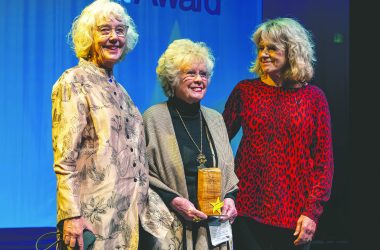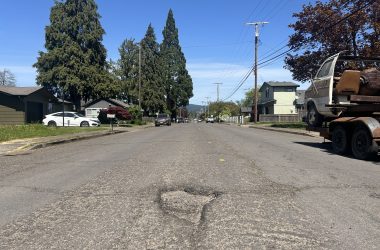What started as an informal way for plant-lovers to gather and learn from each other has steadily grown over the past four decades into a group with about 400 members who share the same passion: gardening.
The Willamette Valley Hardy Plant Group (WVHPG) was founded in 1986 by Roger Gossler and Rozanne Britain, and it’s a nonprofit, volunteer organization whose primary purpose is to educate its members about plants to foster their love of flora.
Gossler, 68, said “it’s pretty thrilling” that a group he started in the ’80s has blossomed into an organization that has cultivated so much love from local members.
He added that they are “plant nerds” who are happy to share their expertise with the group.
Catherine Burke, a 74-year-old Cottage Grove resident who joined in the late ’90s/early 2000s, said she likes being surrounded by “like-minded gardening people” who are “very knowledgeable.”
“There’s a lot of camaraderie, which is just lovely,” Burke said. “I’ve met so many wonderful people and have become fast friends with lots of them, and I think that’s a bonus.”
‘Open Gardens’ concept
The group encourages members to open their gardens to each other, which allows for mingling. Burke said she doesn’t worry about making sure her garden is “really spiffy” for her fellow members, and she even joked that if they see a weed, they should go ahead and pull it.
Open gardens also allow for brainstorming. Creswell resident Teresa Kovarik, 44, said she has taken inspiration from seeing how gardeners use their space and design their gardens, and she also has been introduced to – and taught how to care for – many plants by attending open gardens.
“I always come away with tons of ideas for my garden. It’s super valuable as a gardener to see what other people in your community are doing in their space because they’re dealing with a lot of the same challenges, climate, and weather that you are,” Kovarik said. “Seeing what might be thriving in their garden has been super helpful vs. just going to a nursery and picking something out and hoping it’s going to do well.”

Roger Gossler, co-founder of the Willamette Valley Hardy Plant Group, owns Gossler Farms Nursery at 1200 Weaver Rd. in Springfield.
Wide array of members
While the group’s membership stems from the Willamette Valley area, there are also members who live in Washington, California, and New Mexico who attend the monthly meetings on Zoom. The hybrid meetings are held at the Unitarian Universalist Church at 1685 W. 13th Ave. in Eugene at 7 p.m. on the second Tuesday of each month.
Burke said she loves that the meetings are online because she doesn’t have to drive from Cottage Grove to Eugene if there’s “lousy weather.”
Anyone interested in joining can pick up an informational program from Gossler Farms Nursery at 1200 Weaver Rd. in Springfield. Membership is $30 for a calendar year or $50 for two calendar years.
Members have the chance to learn from a wide array of speakers at each meeting. Gossler said these are “top-quality” speakers who normally would not come to this small of a city as they usually meet in Portland, Seattle, or Vancouver, B.C.
“Everything is educational, but it’s educational in a very fun way – not like a lecture,” president Marian Talen, 70, said. “Many organizations have speakers, but some of them are, quite frankly, boring.”
The WVPHG Plant Sale is the group’s primary form of fundraising and is always held on Mother’s Day weekend. This year’s is May 11 from 9-2 p.m., and it will be held at the Lane County Events Center in the auditorium building.
More than just a plant show
Talen said the group pots thousands of plants each year for the plant sale, and the rest of the building is filled with vendors like gardens, nurseries, and other organizations from throughout Oregon. She added that “it’s a sale by gardeners for gardeners.”
Burke said the community looks forward to the yearly plant sale, adding that people often line up when it first opens.
“I don’t think we’ve seen anybody that comes who’s not wearing a smile,” she said. “Plant people are fun.”
As someone who joined the group when she was in her early 20s, Kovarik encourages young people to try it out.
“There’s trends in gardening just like anything – now I think there’s a big shift happening with an interest in native gardening,” Kovarik said. “I hope those kinds of things get younger people excited and get them in the door potentially because everybody’s super nice and inclusive, and we’re open to anyone at any level of experience.”








